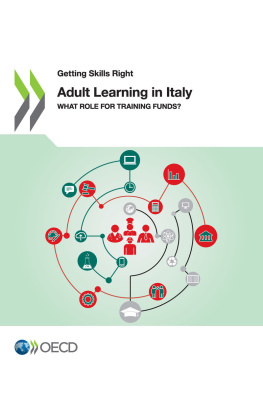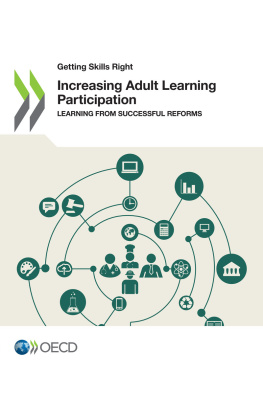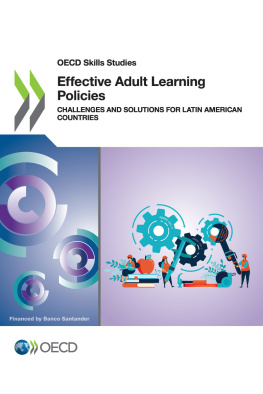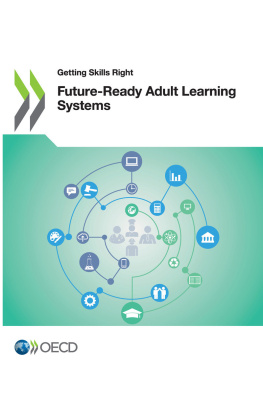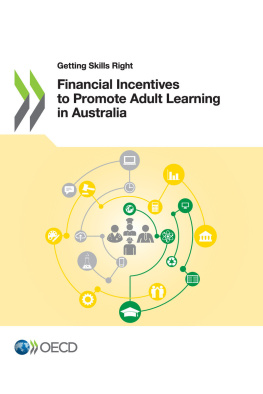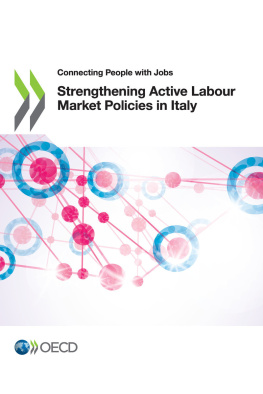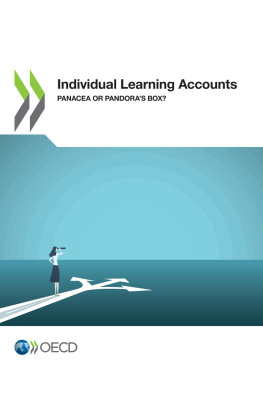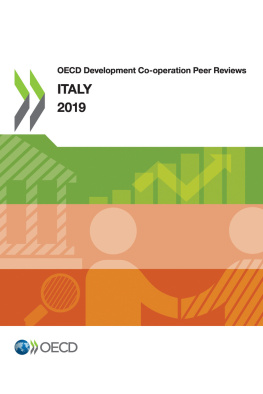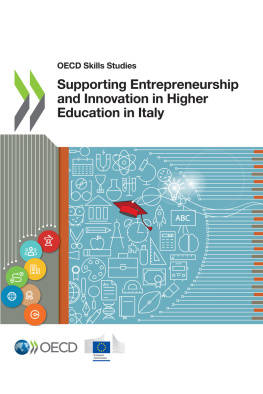OECD - Adult Learning in Italy
Here you can read online OECD - Adult Learning in Italy full text of the book (entire story) in english for free. Download pdf and epub, get meaning, cover and reviews about this ebook. year: 2019, publisher: OECD Publishing, genre: Politics. Description of the work, (preface) as well as reviews are available. Best literature library LitArk.com created for fans of good reading and offers a wide selection of genres:
Romance novel
Science fiction
Adventure
Detective
Science
History
Home and family
Prose
Art
Politics
Computer
Non-fiction
Religion
Business
Children
Humor
Choose a favorite category and find really read worthwhile books. Enjoy immersion in the world of imagination, feel the emotions of the characters or learn something new for yourself, make an fascinating discovery.
Adult Learning in Italy: summary, description and annotation
We offer to read an annotation, description, summary or preface (depends on what the author of the book "Adult Learning in Italy" wrote himself). If you haven't found the necessary information about the book — write in the comments, we will try to find it.
OECD: author's other books
Who wrote Adult Learning in Italy? Find out the surname, the name of the author of the book and a list of all author's works by series.
Adult Learning in Italy — read online for free the complete book (whole text) full work
Below is the text of the book, divided by pages. System saving the place of the last page read, allows you to conveniently read the book "Adult Learning in Italy" online for free, without having to search again every time where you left off. Put a bookmark, and you can go to the page where you finished reading at any time.
Font size:
Interval:
Bookmark:
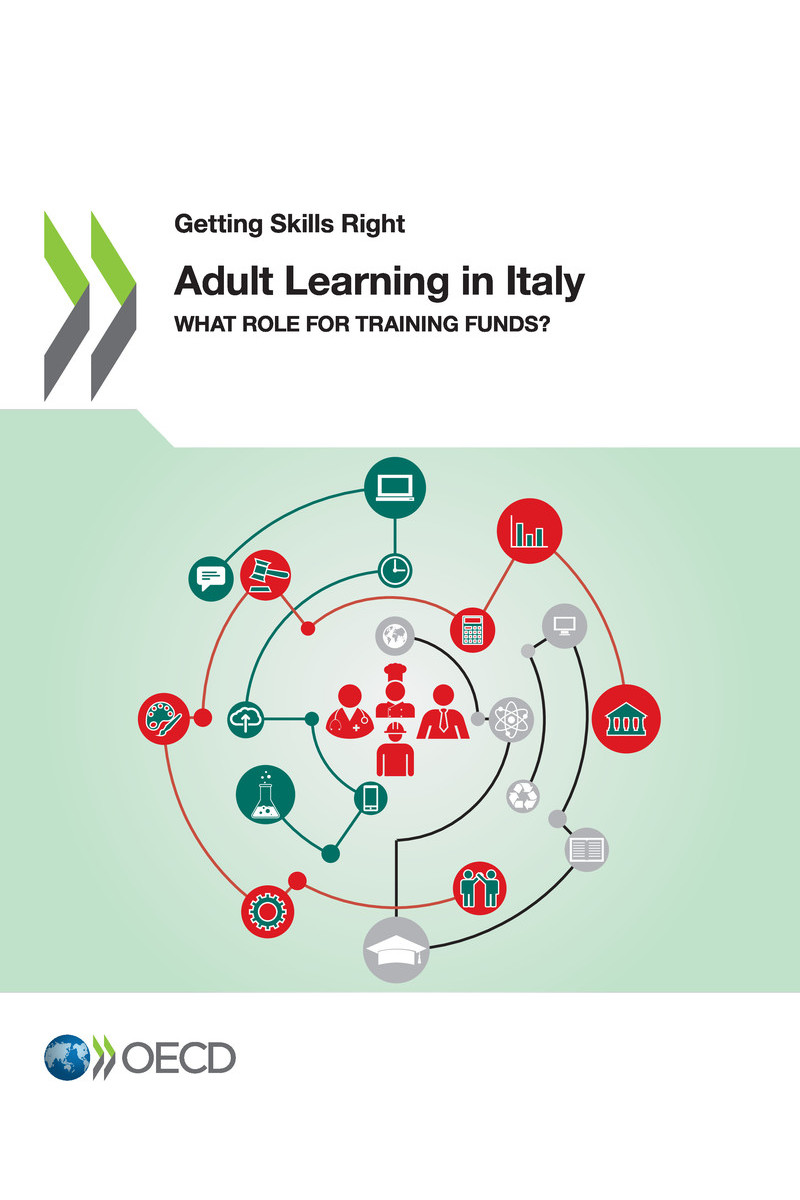
OECD (2019), Adult Learning in Italy: What Role for Training Funds ? , Getting Skills Right, OECD Publishing, Paris.
https://doi.org/10.1787/9789264311978-en
The world of work is changing. New technologies, digitalisation, deepening globalisation and population ageing are having a profound impact on the type and quality of jobs that are available and the skills required to do them. To what extent individuals, firms and economies can harness the benefits of these changes critically depends on the readiness of adult learning systems to help people develop relevant skills for this changing world of work.
While Italy has made major progress in the past decade to up-skill its population and workers, further efforts are needed to improve access to good quality adult learning opportunities. Training Funds (i.e. fondi paritetici interprofessionali per la formazione continua ) represent one important tool through which Italy could face the pressures brought about by the mega-trends, and equip adults and workers with the skills needed to thrive in the labour market and society. This report analyses how Training Funds are designed, used, and monitored, and provides actionable policy recommendations to ensure that they are put to their most effective use.
This report is published under the responsibility of the Secretary-General of the OECD, with the financial assistance of the JPMorgan Chase Foundation. The views expressed in this report should not be taken to reflect the official position of the JPMorgan Chase Foundation.
The work on this report was carried out by Alessia Forti from the Skills and Employability Division of the Directorate for Employment, Labour and Social Affairs, under the supervision of Glenda Quintini (Team Manager on Skills) and Mark Keese (Head of the Skills and Employability Division). The report has benefited from helpful comments provided by Andrea Garnero, Fabio Manca, and staff at the JPMorgan Chase Foundation. The Ministry of Labour and Social Affairs (MLPS), the National Agency for Active Labour Market Policies (ANPAL), the National Institute for the Analysis of Public Policies (INAPP), and other stakeholders, provided useful inputs and feedbacks on the report.
Action on the adult learning front is needed urgently in Italy. As a result of the introduction of new technologies, 15.2% of jobs have a high risk of automation, and a further 35.5% may experience significant changes to how they are performed. Italy also has an old and ageing population. Today there are 3.5 older persons (65+) for every ten working age adults (15-64) the highest rate in the OECD after Japan. Finally, around 38% of Italian adults have low levels of literacy and/or numeracy proficiency, well above the OECD average of 26.3%.
To cope with technological change, longer working lives and the increased skill demands of a knowledge-based economy, many adults will need training to keep skills up to date. However, the Italian adult learning system seems to be ill prepared to face these challenges. Today, only two in ten adults participate in job-related training, about half the OECD average. Moreover, only 60.2% of firms (with at least 10 employees) provide training to their workers, lower than the OECD European average of 76%.
Training Funds represent one important tool through which Italy could face the pressures brought about by the mega-trends, and equip adults and workers with the skills needed to thrive in the labour market and society. Instituted in the early 2000s, today Training Funds cover almost 1 million firms and over 10 million workers, and manage more than EUR 600 million a year, representing one of the most important sources of financing for workers continuous learning in Italy.
Since their inception, Training Funds have encouraged many firms to train their workers, and have certainly contributed to improve access to training opportunities. However, there are challenges. SMEs still face substantial barriers in adhering to/using Training Funds, and many vulnerable groups such as the low-skilled, low-wage workers or older people are often excluded from the training opportunities offered.
Moreover, training is not always of good quality and aligned to the needs of the labour market. Indeed, Training Funds are often used to finance compulsory training, such as occupational health and safety, rather than focussing on developing the skills that could enhance the competitiveness of firms and the productivity of workers.
Font size:
Interval:
Bookmark:
Similar books «Adult Learning in Italy»
Look at similar books to Adult Learning in Italy. We have selected literature similar in name and meaning in the hope of providing readers with more options to find new, interesting, not yet read works.
Discussion, reviews of the book Adult Learning in Italy and just readers' own opinions. Leave your comments, write what you think about the work, its meaning or the main characters. Specify what exactly you liked and what you didn't like, and why you think so.

